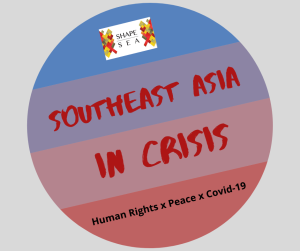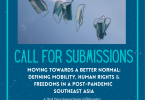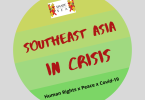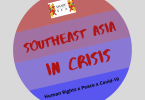Marc PinolDoctoral researcher and Assistant Teacher in Politics at the University of Bristol, UK.
 Governments have an outstanding opportunity to show their leadership to overcome this exceptional health, social, and economic crisis that is the COVID-19 pandemic. Leadership entails complex power dynamics between a (group of) leaders whose task is to engage the civil society with governance structures (Burns, 2012) while keeping a relative balance between the interests of individuals and those of the collective.In Cambodia, COVID-19 will test the skills of the government to manage Human Rights in times of uncertainty, and also whether leadership prevails over autocracy or vice versa. Civil and political rights are stipulated under the International Covenant on Civil and Political Rights (United Nation, 1966) and their universality and relativism are broadly discussed in the academic literature, but what is clear is that when rights-abusive practices raise issues of great moral significance, tradition and culture are slight defense (Donnelly, 2007: 304). Put differently, intolerance to abuse is universal. Therefore, and amid this crisis, governments must still respect fundamental civil and political rights to balance virtue among stakeholders. In any other circumstance, leadership will cease and will give way to autocracy.A comparative analysis between the Republic of China (Taiwan) and Cambodia shows how leadership and some fundamental rights are slipping away. Taiwan ™s strategy to discourage large gatherings, impose social distancing, and practice targeted surveillance (Chiou, 2020) has proven to be relatively efficient. So, while some individual rights have contracted, a collective benefit is expected. Moreover, it is unlikely that Taiwan will maintain these restrictions once the crisis is over. Citizens and institutions have also played a key role in aggregating data to prevent the spread of the virus (Pu, 2020). This aspect contrasts sharply with that of Cambodia. Recently, the Southeast Asian country drafted the Law on National Administration in the State of Emergency that, among others, grants the government unlimited surveillance of telecommunications and control of media and social media (Human Rights Watch, 2020). While measures that restrict freedom of movement or assembly might help to fight the pandemic, restrictions on the use of social media or on the freedom of telecommunications are not likely to do so. It is not the first time that Cambodia faces a similar situation in times of crisis. In 2015, amidst the protests that followed the 2013 elections, the Law on Association and NGOs was passed to restrict the proliferation of NGOs in the country to protect the public interest “ a law that was passed without consultation and seriously affected freedom of association, thus taking agency away from the civil society ever since (Human Rights Watch, 2015). With the current health crisis, any new law that restricts the use of telecommunications is likely to be perpetuated as well; all the more at the expense of civil society and human rights.Ultimately, using the pandemic to justify a state of emergency and allow the passage of laws that curtail civil and political freedoms in the long-run is not leadership. How can it be leadership when it favours the interests of one particular group? A new blow to fundamental civil and political rights can have major consequences for the Cambodian civil society, which has never been as healthy as it should have since democratic structures were implemented in 1991 in the first place.References:Chiou, C. (2020). How Taiwan Battles the Coronavirus. . Available at: https://thediplomat.com/2020/04/how-taiwan-battles-the-coronavirus/ .Donnelly, J. (2007). The Relative Universality of Human Rights. Human Rights Quarterly, 29 (2), pp.281 “306.Human Rights Watch. (2015). Cambodia: Joint Letter on the Draft Law on Associations and Non-Governmental Organizations. . Available at: https://www.hrw.org/news/2015/06/22/cambodia-joint-letter-draft-law-associations-and-non-governmental-organizations .Human Rights Watch. (2020). Cambodia: Emergency Bill Recipe for Dictatorship. . Available at: https://www.hrw.org/news/2020/04/02/cambodia-emergency-bill-recipe-dictatorship .James Macgregor Burns and Hoopla Digital (2012). Leadership. United States: No Publisher. Available at: https://books.google.co.uk/books?id=lhrPS_s7EawC&dq=leadership&lr=&source=gbs_navlinks_s .Pu, V. (2020). The Coronavirus Outbreak: How Democratic Taiwan Outperformed Authoritarian China. . Available at: https://thediplomat.com/2020/02/the-coronavirus-outbreak-how-democratic-taiwan-outperformed-authoritarian-china/ .United Nations. (1966). OHCHR | International Covenant on Civil and Political Rights. . Available at: https://www.ohchr.org/en/professionalinterest/pages/ccpr.aspx .
Governments have an outstanding opportunity to show their leadership to overcome this exceptional health, social, and economic crisis that is the COVID-19 pandemic. Leadership entails complex power dynamics between a (group of) leaders whose task is to engage the civil society with governance structures (Burns, 2012) while keeping a relative balance between the interests of individuals and those of the collective.In Cambodia, COVID-19 will test the skills of the government to manage Human Rights in times of uncertainty, and also whether leadership prevails over autocracy or vice versa. Civil and political rights are stipulated under the International Covenant on Civil and Political Rights (United Nation, 1966) and their universality and relativism are broadly discussed in the academic literature, but what is clear is that when rights-abusive practices raise issues of great moral significance, tradition and culture are slight defense (Donnelly, 2007: 304). Put differently, intolerance to abuse is universal. Therefore, and amid this crisis, governments must still respect fundamental civil and political rights to balance virtue among stakeholders. In any other circumstance, leadership will cease and will give way to autocracy.A comparative analysis between the Republic of China (Taiwan) and Cambodia shows how leadership and some fundamental rights are slipping away. Taiwan ™s strategy to discourage large gatherings, impose social distancing, and practice targeted surveillance (Chiou, 2020) has proven to be relatively efficient. So, while some individual rights have contracted, a collective benefit is expected. Moreover, it is unlikely that Taiwan will maintain these restrictions once the crisis is over. Citizens and institutions have also played a key role in aggregating data to prevent the spread of the virus (Pu, 2020). This aspect contrasts sharply with that of Cambodia. Recently, the Southeast Asian country drafted the Law on National Administration in the State of Emergency that, among others, grants the government unlimited surveillance of telecommunications and control of media and social media (Human Rights Watch, 2020). While measures that restrict freedom of movement or assembly might help to fight the pandemic, restrictions on the use of social media or on the freedom of telecommunications are not likely to do so. It is not the first time that Cambodia faces a similar situation in times of crisis. In 2015, amidst the protests that followed the 2013 elections, the Law on Association and NGOs was passed to restrict the proliferation of NGOs in the country to protect the public interest “ a law that was passed without consultation and seriously affected freedom of association, thus taking agency away from the civil society ever since (Human Rights Watch, 2015). With the current health crisis, any new law that restricts the use of telecommunications is likely to be perpetuated as well; all the more at the expense of civil society and human rights.Ultimately, using the pandemic to justify a state of emergency and allow the passage of laws that curtail civil and political freedoms in the long-run is not leadership. How can it be leadership when it favours the interests of one particular group? A new blow to fundamental civil and political rights can have major consequences for the Cambodian civil society, which has never been as healthy as it should have since democratic structures were implemented in 1991 in the first place.References:Chiou, C. (2020). How Taiwan Battles the Coronavirus. . Available at: https://thediplomat.com/2020/04/how-taiwan-battles-the-coronavirus/ .Donnelly, J. (2007). The Relative Universality of Human Rights. Human Rights Quarterly, 29 (2), pp.281 “306.Human Rights Watch. (2015). Cambodia: Joint Letter on the Draft Law on Associations and Non-Governmental Organizations. . Available at: https://www.hrw.org/news/2015/06/22/cambodia-joint-letter-draft-law-associations-and-non-governmental-organizations .Human Rights Watch. (2020). Cambodia: Emergency Bill Recipe for Dictatorship. . Available at: https://www.hrw.org/news/2020/04/02/cambodia-emergency-bill-recipe-dictatorship .James Macgregor Burns and Hoopla Digital (2012). Leadership. United States: No Publisher. Available at: https://books.google.co.uk/books?id=lhrPS_s7EawC&dq=leadership&lr=&source=gbs_navlinks_s .Pu, V. (2020). The Coronavirus Outbreak: How Democratic Taiwan Outperformed Authoritarian China. . Available at: https://thediplomat.com/2020/02/the-coronavirus-outbreak-how-democratic-taiwan-outperformed-authoritarian-china/ .United Nations. (1966). OHCHR | International Covenant on Civil and Political Rights. . Available at: https://www.ohchr.org/en/professionalinterest/pages/ccpr.aspx .





